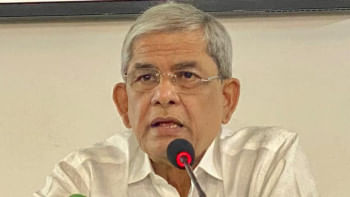18,000MW power production planned for summer

Load shedding during the summer days will be kept at a tolerable level, Power and Energy Adviser Fouzul Kabir Khan said yesterday.
"I won't say there will be no power outage during the summer, but the load shedding will remain within a tolerable level. And there will be no difference between urban and rural areas," he said at a seminar, titled "Energy Crisis: Way Forward," organised by the Forum for Energy Reporters Bangladesh (FERB) at Bidyut Bhaban in the capital.
He said plans are in place to produce 18,000 megawatts (MW) during peak demand in summer, up from the current 16,000 MW. Additional demand will be met through coal and LNG imports.
Kabir added that when the interim government took charge, the power sector was in a disastrous state. "We have paid most overdue and late payments to companies."
The overdue bill, originally around US $3.2 billion, has been reduced to US $600 million and is expected to hit zero by the end of the fiscal year in June, he added.
To clear the payments, the government cut allocations from unnecessary projects. Kabir noted that late payments had also raised power production costs.
On gas exploration, Kabir said the government only took steps it could complete within its tenure.
Regarding electricity prices, Kabir said negotiations are ongoing with coal-based power plants, setting the Matarbari plant's rate of Tk 8.44 per kilowatt-hour (kWh) as a benchmark. "We are asking them why their prices differ by Tk 3-4 instead of Tk 0.30-0.40," he said.
Activities to reduce system loss will be visible by next June, he added.
Addressing the recent gas price hike for new industries, Kabir said it was set based on the marginal cost.
In the keynote paper, energy expert Ijaz Hossain said Bangladesh's energy crisis began in 2019 when gas production declined and oil replaced gas, increasing the government's energy subsidy burden.
"Gas reserves were depleting, but exploration was ignored, while LNG import was preferred at a time when the government should have gone for aggressive production," he said.
He noted that local production stood at 2,786 million cubic feet of gas a day (mmcfd) in 2019 but has now fallen to 1,800 mmcfd. Future governments should promise to keep production around 2,000 mmcfd by exploring at least 10 wells a year, he said.
Bangladesh will also need to import 2,600 mmcfd of LNG after 2030 and build two new floating storage and regasification units (FSRUs), he added.
Dr Shamsul Alam, energy adviser to the Consumers' Association of Bangladesh, said Bangladesh is shifting towards becoming an LNG-importing nation, with domestic gas's share expected to fall from 75 percent to 25 percent by 2030.
Dr Golam Moazzem, research director at the Centre for Policy Dialogue, called for a new energy policy with a clear transition plan.
He warned that ongoing LNG deals with Qatar and the US could impact the country's long-term renewable energy goals.

 For all latest news, follow The Daily Star's Google News channel.
For all latest news, follow The Daily Star's Google News channel. 








Comments